Transcellular transport - Study guides, Class notes & Summaries
Looking for the best study guides, study notes and summaries about Transcellular transport? On this page you'll find 287 study documents about Transcellular transport.
Page 3 out of 287 results
Sort by
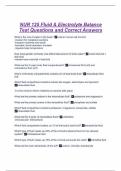
-
NUR 125 Fluid & Electrolyte Balance Test Questions and Correct Answers
- Exam (elaborations) • 8 pages • 2024
-
Available in package deal
-
- $8.99
- + learn more
What is the role of water in the body? -vital in normal cell function -medium for metabolic reactions -transport nutrients and waste -lubricant, shock absorber, insulator -regulate body temperature How does gender and body size affect total amount of body water? -more body fat = less fluid -women have more fat = less fluid What are the 2 major body fluid compartments? intracellular fluid (icf) and extracellular fluid (ecf) Which of the body compartments contains 2/3 of total body fluid? intra...
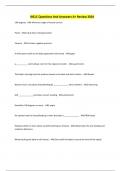
-
IBCLC Questions And Ansswers A+ Review 2024
- Exam (elaborations) • 185 pages • 2024
- Available in package deal
-
- $19.49
- + learn more
IBCLC Questions And Ansswers A+ Review 2024 140 degrees - ANS-Minimum angle of mouth corners Piston - ANS-Up & down chewing motion Vacuum - ANS-Creates negative pressure A wide open mouth as the baby approaches the breast - ANS-gape a___________ latch allows room for the nipple to stretch. - ANS-asymmetric The baby's chin digs into the mothers breast in the back and forth motion. - ANS-Rocker Women learn a lot about breastfeeding by _____________ other mothers. - ANS-observing Self ____...

-
Nursing Fundamentals Exam 4: keiser university Questions & Answers Solved 100% Correct!!
- Exam (elaborations) • 24 pages • 2023
- Available in package deal
-
- $10.99
- + learn more
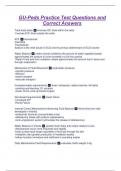
-
GU-Peds Practice Test Questions and Correct Answers
- Exam (elaborations) • 11 pages • 2024
-
Available in package deal
-
- $8.99
- + learn more
Total body water -Involves ICF (fluid within the cells) -Involves ECF (fluid outside the cells) ECF Intravascular Interstitial Transcellular Sodium is the chief solute in ECG and the primary determinant of ECG volume Water Balance -under normal conditions the amount of water ingested closely approximates the amount of urine excreted in a 24-hour period -Water if food and from oxidation closely approximates the amount lost in feces and through evaporation Mechanism of Fluid Movement -hydrostat...
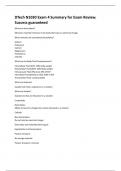
-
DTech N1030 Exam 4 Summary for Exam Review. Success guaranteed
- Exam (elaborations) • 22 pages • 2024
-
- $11.49
- + learn more
DTech N1030 Exam 4 Summary for Exam Review. Success guaranteed What are electrolytes? Minerals: Essential minerals in the body that have an electrical charge What minerals are considered electrolytes? Sodium Potassium Calcium Magnesium Phosphorus Chloride What are the Body Fluid Compartments? Intracellular Fluid (ICF): 40% body weight Extracellular Fluid (ECF): 20% Body weight Intravascular Fluid (Plasma): 20% of ECF Interstitial Fluid (between cells): 80% of ECF Transcellular Fl...
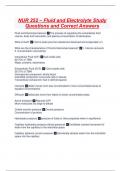
-
NUR 252 – Fluid and Electrolyte Study Questions and Correct Answers
- Exam (elaborations) • 13 pages • 2024
-
Available in package deal
-
- $9.99
- + learn more
Fluid and Electrolyte balance The process of regulating the extracellular fluid volume, body fluid osmolality, and plasma concentration of electrolytes What is fluid? Fluid is water plus the substances dissolved and suspended in it What are the characteristics of Fluid & Electrolyte balance? 1. Volume (amount) 2. Concentration (osmolarity) Intracellular Fluid (ICF) fluid inside cells 63-70% of TBW Water, proteins, electrolytes Extracellular Fluid (ECF) Fluid outside cells 30-37% of TBW Intra...
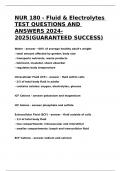
-
NUR 180 - Fluid & Electrolytes TEST QUESTIONS AND ANSWERS 2024-2025(GUARANTEED SUCCESS).
- Exam (elaborations) • 9 pages • 2024
-
- $14.99
- + learn more
Water ~60% of average healthy adult's weight - total amount affected by gender, body size - transports nutrients, waste products - lubricant, insulator, shock absorber - regulates body temperature Intracellular Fluid (ICF) - fluid within cells - 2/3 of total body fluid in adults - contains solutes: oxygen, electrolytes, glucose Previous Play Next Rewind 10 seconds Move forward 10 seconds Unmute -- / -- Full screen Brainpower Read More ICF Cations potassium a...
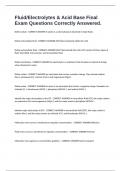
-
Fluid/Electrolytes & Acid Base Final Exam Questions Correctly Answered.
- Exam (elaborations) • 11 pages • 2024
-
Available in package deal
-
- $14.49
- + learn more
Fluid/Electrolytes & Acid Base Final Exam Questions Correctly Answered. Define solute - CORRECT ANSWER A solute is a solid substance dissolved in body fluids. Define intracellular fluid - CORRECT ANSWER (ICF) fluid contained within the cells Define extracellular fluid - CORRECT ANSWER (ECF) fluid outside the cells. ECF consists of three types of fluid: interstitial, intravascular, and transcellular fluid. Define electrolyte - CORRECT ANSWER An electrolyte is a substance that develops...
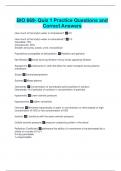
-
BIO 669- Quiz 1 Practice Questions and Correct Answers
- Exam (elaborations) • 12 pages • 2024
-
Available in package deal
-
- $9.99
- + learn more
How much of the body's water is intracellular? 2/3 How much of the body's water is extracellular? 1/3 Interstitial: 75% Intravascular: 25% Smaller amountsL sweat, urine, transcellular Populations susceptible to dehydration: Pediatric and geriatric Net filtration forces favoring filtration minus forces opposing filtration Aquaporins small pores in cells that allow for water transport across plasma membrane Solute Electrolytes/proteins Solvent Water/plasms Osmolarity Concentration of osmo...
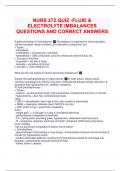
-
NURS 272 QUIZ -FLUID & ELECTROLYTE IMBALANCES QUESTIONS AND CORRECT ANSWERS
- Exam (elaborations) • 12 pages • 2024
-
Available in package deal
-
- $8.99
- + learn more
Explain the basics of fluid balance. *fluid balance is important for temp regulation, nutrient transport, waste excretion, join lubrication, protections, etc! > Types... - intracellular - extracellular = intravascular, interstitial - transcellular = CBS, pericardial, synovial, intraocular, pleural fluids, etc... > Sources of fluid loss - insensible = via skin & lungs - sensible = via kidney & GI tract > avg I&O = 1,500-3,500/24 hrs What are the risk factors for fluid & electrolyte imba...

Study stress? For sellers on Stuvia, these are actually golden times. KA-CHING! Earn from your study resources too and start uploading now. Discover all about earning on Stuvia


